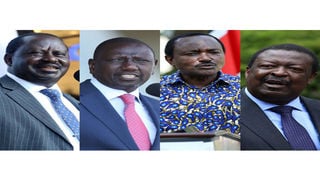
From left: ODM leader Raila Odinga, Deputy President William Ruto, Wiper leader Kalonzo Musyoka and ANC leader Musalia Mudavadi.
| File | Nation Media GroupNews
Premium
Covid-19 rallies: How leaders are fuelling infections surge
Politicians, led by Deputy President William Ruto and ODM leader Raila Odinga, continue to blatantly disregard the ban on political gatherings amid Covid-19 spike in the country.
In the last two months, Dr Ruto and Mr Odinga have been hosting and addressing crowds across the country, with the deputy President hosting Tangatanga leaders at his Karen home yesterday.
The meetings have continued unabated despite repeated bans by President Uhuru Kenyatta and Health Cabinet Secretary Mutahi Kagwe, the latest issued last week.
At these political crowd-puller events, the script is the same; no or minimal social distancing, no or poor masking, no mention of Covid-19 and no sanitising — especially at meet-the-people tours and roadside rallies.
The gatherings have been partly blamed for the resurgence of Covid-19 infections, hospitalisations and deaths, with the national tally crossing the 4,000 mark on Wednesday.

Counties that have witnessed recent political activity — including Nairobi, Kiambu, Nakuru, Murang’a, Mombasa, Kilifi and Lamu — are among emerging hotbeds of the virus that has so far infected 208,262 people, including 1,571 yesterday alone.
Kiambu, which had a by-election pitting Dr Ruto against President Uhuru Kenyatta in Kiambaa recently, is, for instance, battling a crippling crisis, with its Tigoni isolation centre lacking space for Covid patients.
“We may not be able to take in any more patients… because we cannot cope with the provision of oxygen. We are now receiving four tonnes of oxygen every 12 hours,” Governor James Nyoro said early this week.
A fortnight ago, President Kenyatta, Dr Ruto and Mr Odinga also camped at the Coast, addressing public gatherings and series of rallies.
Today, Coast counties, led by Mombasa, Kilifi and Kwale, are sounding the alarm over rising community infections of the aggressive and lethal Delta variant.
The bad manners by the political class have caught the attention of President Kenyatta.
“I would like to appeal to the leaders. We have on so many occasions led in breaking these measures, and that includes myself. We have held rallies where no social distancing was observed, while some of the attendees did not wear masks,” Mr Kenyatta said late last year.
“I would like the media to call out politicians, including myself, when we do these wrongs. We must be held accountable. It is important that on this period, we lead from the front by following the laid down protocols.”
On March 13, President Kenyatta once again ‘banned’ rallies. This was observed shortly, before the political cabals were at it again.
On May 25, Mr Odinga, fresh from isolation after contracting the virus, broke the rules, holding a Building Bridges Initiative [BBI] rally in Kisumu, despite a ban on political gatherings.
Even the deadly Indian example, where elections preceded its apocalyptic infections that saw it lose over 200,000 people within two months, has not deterred leaders from pursuing their political interests, with fatal results.
Ironically, even as Nyanza was battling the third wave, with all the available Intensive Care Unit [ICU] facilities full, Mr Odinga was in Mombasa calling upon President Kenyatta to fully open the country.
“We have to be sober on this Covid-19 issue now that the virus is with us here to stay. The economy has run aground, and we cannot continue this way and assume all is well. We have to balance between restrictions and the economy,” Mr Odinga said, while addressing an Idd baraza in Mvita, Mombasa. Mr Odingas’ sentiments were echoed by Mombasa Governor Hassan Joho whose administration is now battling stop surging infections, with Coast General Teaching and Referral Hospital, the largest health facility in the region, overwhelmed.
“We are recording more young people being infected. We have also seen people who have been vaccinated getting infected,” said County Commissioner Gilbert Kitiyo, who is the county security committee chairman.
Experts are warning that the cases will continue to soar if stricter measures in the hotspot counties are ignored.
Dr Ahmed Kalebi, consultant pathologist, yesterday told the Nation that the lurking danger will be a worse escalation of the surge in infections with more hospitalisations and deaths.
“The situation is actually quite dire. This delta variant driven wave is likely to escalate more than the previous waves,” he said
He also asked law enforcers to implement public health measures that the Health ministry has time and again talked about.
“For the rest of the country, the law enforcement agencies and leaders need to be firmer in checking and ensuring people are wearing masks and taking precautions,” he said.
The defiance by politicians comes amid the spread of a highly transmissible variant with only two per cent of the population having been fully vaccinated.
Dr Nelly Yatich, an epidemiologist, is concerned that Kenyans could be dancing with death with their open ignorance amid a new variant that has driven a high number of cases globally.
In a Twitter post, she said: “When a highly transmissible virus is allowed to freely spread with no non-pharmaceutical interventions in place, among a large number of susceptible people a surge is neither surprising nor unexpected.”
She told the Nation that non-pharmaceutical strategies in the fight against Covid-19 need to be re-examined.
“We need to have masking campaigns –proper masking at that, not masks under the chin. The carrying capacity in public transport should strictly be adhered to and the public rallies and sporting events to be avoided,”she said.
“Even capacity in eateries and churches should be enforced. Funerals and weddings are other venues for the spread of the disease,” she added.
Yesterday, a defeated Mr Kagwe blamed politicians and individuals going to political rallies for the latest surge in Covid-19 cases.
“If people are going to a political rally, the responsibility lies with both the politician as well as those that attend the rally,” said Mr Kagwe.






